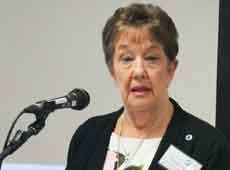Q&A: Pauline Stewart

Pauline Stewart has been a registered psychologist for 23 years in the education sector and private practice. Six months ago the South Islander, who also has a business background in farming, decided to set up a new nationwide service for families supporting a whānau member with alcohol and other drug misuse.
Q Why did you see a need for a national support service for families?
As a psychologist, I’ve seen the struggle families go through. It can be a long and challenging journey. Families need to build coping and resilience skills to stay involved. Despite the huge need, New Zealand doesn’t have a nationwide organisation. I thought "if it is to be, it's up to me". I researched organisations around the world and was impressed with Family Drug Support Australia, set up 22 years ago by Tony Trimingham. He’s been a great mentor.
Q What is your vision for Family Drug Support?
A Our vision is to be the first port of call for families needing support, no matter where they live in New Zealand. We’ve set up an 0800 helpline with trained volunteers able to take calls between 9am and 10pm, seven days a week. Calls are free regardless of where from or what kind of phone. We’ve also set up a website with a huge range of resources by experts and families with lived experience. Our Stepping Stones programme to help families deal with the emotional stress of supporting a whānau member starts in Christchurch in late March or early April. The programme’s been run successfully for over a decade in Australia. The vision is to be able to run it in other main centres.
Q Why is it important to support affected family members?
Family support is a key element in successful outcomes for people with alcohol and other drug misuse. Family members know the person they care about better than anyone else. They’re invested in staying involved for a whole number of reasons: financial, emotional, physical and relational. Often there’s been a family breakdown due to the trauma associated with alcohol and other drug misuse, so building those relationships back up again is very important. Having family involved provides hope and a support system. It’s difficult to solve problems in isolation.
Q Why do family members need help to stay involved?
Family members need to know the stages of change people go through in their journey so they can continue to give support even when change is challenging. For example, 80 percent of people who quit methamphetamine experience depression, so lapsing is really common. It’s important for families to understand that so they don’t throw the baby out with the bath water when there’s a lapse. Research tells us that family members who seek help, even just a listening ear, feel relieved to experience understanding and support.
Q Do families also have to overcome stigma?
Families trying to help a loved one often feel a huge amount of stigma. Being able to share the same concealed stigmas with other families often results in increased self-esteem and significantly lower levels of anxiety and depression because they no longer feel so alone.
Q What do family members often do wrong when trying to support loved ones?
We never say families get it wrong, because they’re doing the very best they can at the time, with the best of intentions. Initially, many families cope by denial and this comes with lots of emotion: anger, shame, blaming, chronic sorrow and the like. What follows are often rigid ultimatums, rescuing, attempting to control the situation, poor boundaries and brave faces. The easy-to-say things like ‘rock bottom’ and ‘tough love’ aren’t worthwhile because there’s a hundred rock bottoms and tough love is not love. Chaos is often experienced. Many families talk of their experience as like walking on a tightrope. About two-thirds along, you realise you need a balance pole. If you’re not looking after yourself, it’s really difficult to last the journey.
Q How does your background equip you for pushing FDS forwards?
I also have a background as a business woman, which has given me a good understanding of governance and management. In the last six months, I’ve gained seeding funding from private donors to set up FDS as a registered charity with an experienced board, trained a group of support line volunteers and had a website built by Meta Digital and an excellent rostering system developed.
Q After six months, how are things going?
A Really well. Now we’re up and running, our top priority is becoming well-known throughout New Zealand as the first port of call for families. I’m working hard alongside our cultural advisor to ensure we have a culturally appropriate service. Funding is also a focus. We’re looking for ongoing funding. One of the recommendations of the government inquiry was to work with NGOs and families, so we’re hoping there will be places that we can apply.
Q What help can your 0800 call staff offer?
Our trained volunteers are not counsellors, but they’re there to listen and help people find resources in their areas. There are lots of small groups dotted around New Zealand, but people often don’t know how to find them. Our website contains a wealth of information that people can tap into any time they need from anywhere in New Zealand.
- Pauline Stewart is the founder of Family Drug Support Aotearoa. www.fds.org.nz | 0800 FDSupport
Recent news

Reflections from the 2024 UN Commission on Narcotic Drugs
Executive Director Sarah Helm reflects on this year's global drug conference
What can we learn from Australia’s free naloxone scheme?
As harm reduction advocates in Aotearoa push for better naloxone access, we look for lessons across the ditch.

A new approach to reporting on drug data
We've launched a new tool to help you find the latest drug data and changed how we report throughout the year.

